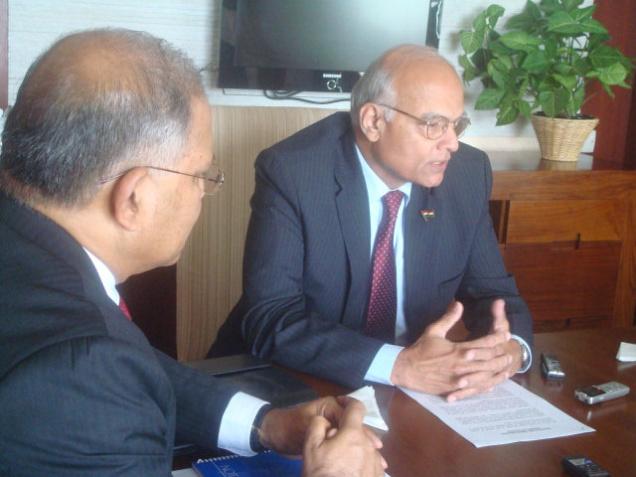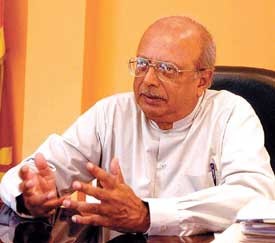Sri Lanka: Sufficient consensus to make PSC meaningful
The government’s determination to show progress in regard to a political solution and to improving its human rights image is evident in recent developments. During his recent visit, the Indian National Security Advisor Shivshankar Menon is reported to have urged government leaders to keep its promises to India. The Indian government’s position that

National Security Advisor Shiv Shankar Menon addresses members of the Indian Media after meeting Sri Lankan President Mahinda Rajapaksa, in Colombo on Friday. Indian High Commissioner to Sri Lanka Ashok K. Kantha is to his right. Photo: The Hindu
the government should deliver on its promise to go beyond the 13th Amendment poses a major challenge. It is obvious that a country like India, which is no less than a global great power, and quite possibly a superpower in the near future, cannot accept being made to look being taken for a ride by its close neighbour in the eyes of the world. With President Mahinda Rajapaksa on the verge of taking over the Chairmanship of the Commonwealth, it appears that the government is desirous of demonstrating to India and to the international community that it is taking its international responsibilities more seriously. The government is now making a renewed effort to find a political solution to the ethnic conflict through the process of a Parliamentary Select Committee.
Empower
The government has appointed a Parliamentary Select Committee (PSC) to find a political solution that would “empower the people to live together as one nation.” The initial meeting of the PSC was attended only by government members and not attended by any of the opposition parties. The government’s disappointment at this boycott is evident from its appeal to the visiting Indian national security advisor to persuade the TNA to join the PSC. The government appointed 19 members representing the spectrum of opinion on the subject including both hard line nationalist Sinhalese and progressive leftist parliamentarians but with some surprise exclusions, including its own alliance partner the SLMC and Prof. Tissa Vitarana who headed the government’s last attempt to arrive at a political solution. The opposition parties which were allocated 12 members did not appoint a single member and so the first meeting of the PSC could be described as a meeting of a government sub-committee rather than a PSC.
Demanded
Both the UNP and TNA have set pre-conditions for the government to meet prior to their nominating any members to the PSC. These include the UNP’s demand that the government should accept to base the discussions on the government’s international commitments, agreements and also on restoring the independence of state institutions such as the public service, judiciary and elections commission from the government’s political interference. The independence of these institutions which was upheld by the 17th Amendment to the constitution of 2000, was effectively nullified by the 18th Amendment passed by the government in 2010 using its 2/3 majority. The TNA has demanded that the government should make known its position on the devolution of power to them in bilateral negotiations prior to joining the PSC. The burden of proof is on the government to show that the PSC is not going to be one in which the government once again displays its bulldozer majority or becomes a time buying exercise until international pressure on the country gets reduced.
Good start
One of the main criticisms being leveled against the government internationally is its failure to make any progress towards a mutually agreeable political solution even four years after the end of the war. On the contrary, the present appearance is one of growing political polarization that is dividing the country in heart and mind, even while its territory has
been unified. In this context, there are several advantages that would accrue to the government in the event the opposition parties join the PSC. It would enable the government to showcase the reconciliation process within the country to the international community by pointing out to the bi-partisan participation of both government and opposition in the search for a political solution to the ethnic conflict.
Tamil-run
However, the present political context within which the present PSC has been appointed does not inspire confidence. It sends a message that the soon-to-be-elected Northern Provincial Council is actually vulnerable to having its power curtailed. The origin of the PSC can be traced back to the government’s concern about facing a Tamil-run provincial council in the Northern Province. From the time when the government decided that it had to go ahead with holding the election to the Northern Provincial Council, it has been expressing its desire to reduce the devolution of powers to the provinces. There were many indications that the government was about to seek the passage of a 19th Amendment to the Constitution that would reduce the powers of the provincial council system as a whole. It is generally believed that pressure from the Indian government, and the threat of a boycott of the Commonwealth Heads of Government Meeting (CHOGM) in November, forestalled such plans to pass the 19th Amendment into law.
Opposition
The reluctance of the opposition political parties to join the PSC needs also to be seen in the context of the last PSC to be appointed by the government which investigated charges against the former Chief Justice. The last PSC had 11 members of which 7 were from the government and 4 from the opposition. On that occasion government members utilized their majority within the PSC to do exactly as they wanted in disregard of the wishes of opposition members. Eventually opposition members withdrew from the PSC in protest, as the government members continued to do what they wanted despite the protests of the opposition representatives in the PSC.
Necessary compromise
The difficulty in getting the opposition to participate in the present PSC is that its composition is stacked in favour of the government. This will once again permit the government to decide exactly as it wants in the PSC, just as it did in the case of the former Chief Justice. There can be no incentive for the opposition parties to join the PSC unless the government demonstrates a seriousness of purpose that includes a fair decision making process. If the government is serious about getting the opposition parties to participate in the PSC it is necessary that it should convince them that the debacle that occurred at the last PSC that investigated the former Chief Justice should not recur. If the government is serious about getting the opposition parties to join the PSC it needs to assure them that they will not be bulldozed through the system of majority voting, but that decisions will be taken on the basis of consensus.
South Africa
The South African example of negotiating a peace agreement between those who controlled the government and the opposition is instructive in this regard. In South Africa, decisions were not taken on the basis of a majority vote. Rather it was taken on the basis that the main parties to the conflict agreed with the proposals that were on the table. They came up with the useful concept of a “Sufficient Consensus” which meant that the parties that really mattered had to agree. In general, the practice of consensus requires the majority to reach out to smaller groups and take their interests into account. In South Africa, sufficient consensus meant consensus of all the parties at the table when that was possible, but it also meant that if the ANC said no, another proposal had be put forward, while if a less important party dissented, the process generally continued to move forward.
Root causes
In South Africa a practice developed in the constitution-making process of accepting “sufficient consensus,” which meant the agreement of the two main political parties. In Sri Lanka, this would certainly mean the ruling party and UNP, but also the TNA and SLMC as the two main parties representing the ethnic minorities. There has to be a reassurance to the ethnic minority parties that the fate of former Chief Justice Shirani Bandaranayake will not be their fate as well, as it very well could be if the unbridled power of majority rule is made to apply to the PSC. The root cause of the ethnic conflict is the imposition of the will of the permanent Sinhalese ethnic majority upon the ethnic minorities. It will be counterproductive, and get the country nowhere, to reproduce this same inequity within the PSC that is aimed at “empowering the people of Sri Lanka to live as one nation.” The practice of “Sufficient Consensus,” on the other hand, could lead to a meaningful political outcome that is sustainable and leads to national reconciliation.

